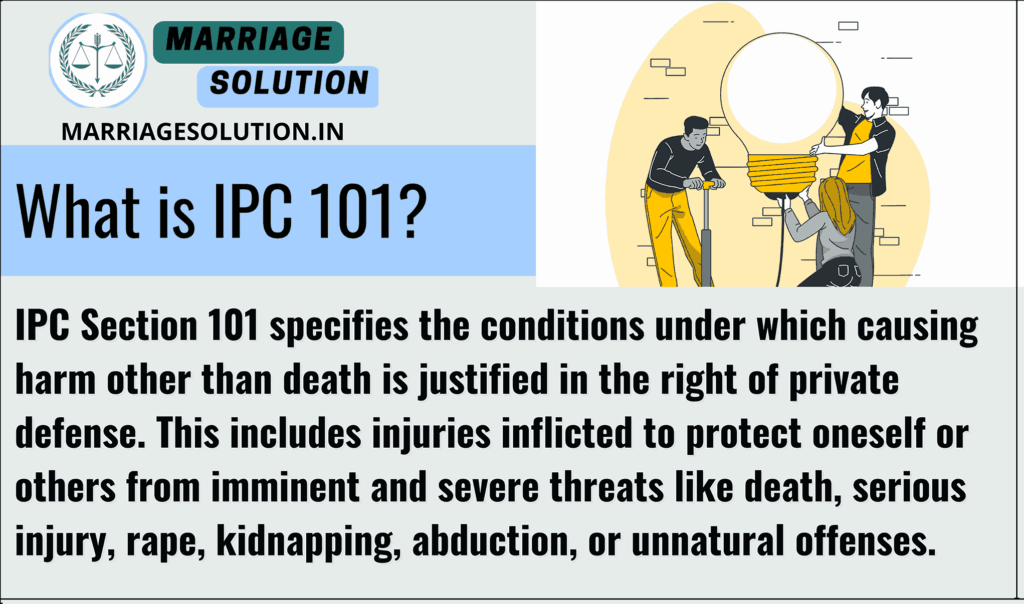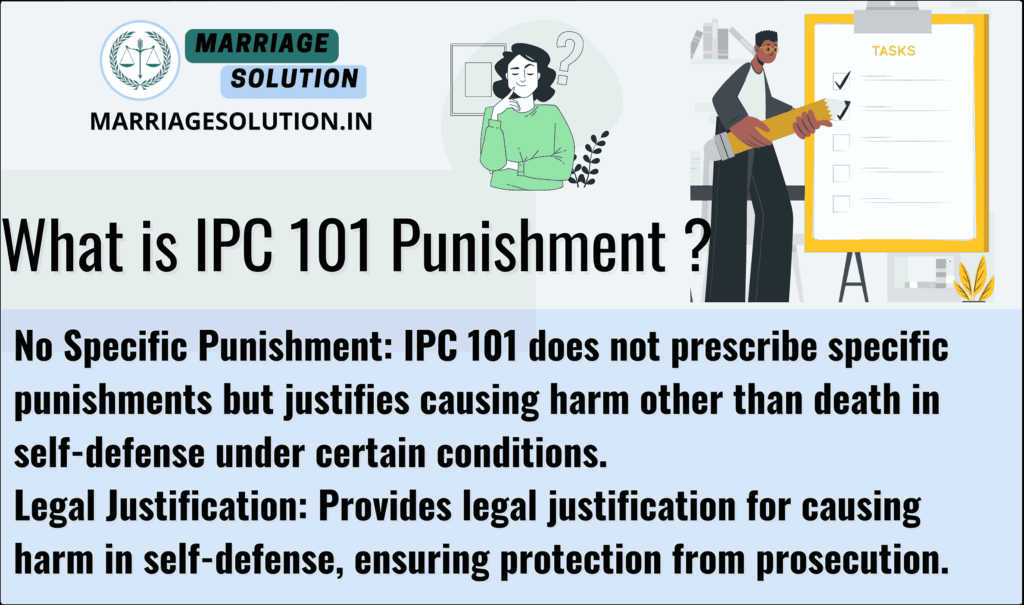Introduction of IPC 101
IPC Section 101 extends the right of private defense to causing harm other than death. This section ensures that individuals can protect themselves from immediate and severe threats without facing prosecution, provided the force used is proportional to the threat.
- Introduction of IPC 101
- What is IPC Section 101 ?
- IPC Section 101 Overview
- IPC 101 Punishment
- 101 IPC bailable or not ?
- Section 101 IPC case laws
- Section 101 IPC in short information
- IPC 101 FAQs
- If you need support with court proceedings or any other legal matters, don’t hesitate to reach out for assistance.
What is IPC Section 101 ?
IPC Section 101 specifies the conditions under which causing harm other than death is justified in the right of private defense. This includes injuries inflicted to protect oneself or others from imminent and severe threats like death, serious injury, rape, kidnapping, abduction, or unnatural offenses.

IPC Section 101 Overview
IPC 101 lays down the exceptions and limitations to the general right of private defense provided under IPC 100. It specifies the situations where the plea of self-defense will not be considered legally valid, such as using excessive force, acting against public authorities, having an opportunity to avoid confrontation, and more.
Key Points of IPC Section 101
- Scope of Self-Defense
- IPC Section 101 allows individuals to defend themselves by causing harm other than death when faced with certain threats.
- This provision ensures that people can protect themselves without fear of legal repercussions if the force used is appropriate.
- Situations Justifying Harm
- The law applies when individuals face threats like death, serious injury, rape, kidnapping, abduction, or unnatural offenses.
- It provides legal backing for actions taken in immediate self-defense against these threats.
- Proportionality of Force
- The force used in self-defense must be proportional to the threat faced.
- Excessive force beyond what is necessary to prevent the threat is not justified under IPC 101.
- Immediate Threat Requirement
- The threat must be immediate and real for the harm inflicted to be justified.
- Actions taken in self-defense should be a direct response to the threat at hand.
- Legal Protection
- IPC 101 offers protection from prosecution for individuals who cause harm in genuine self-defense situations.
- This ensures that people do not hesitate to defend themselves due to fear of legal consequences.
- Clarification on Deadly Force
- While IPC 101 covers harm other than death, deadly force is covered under IPC Section 100.
- This distinction helps in understanding the appropriate level of force for different threats.
IPC 101 Punishment
No Specific Punishment: IPC 101 does not prescribe specific punishments but justifies causing harm other than death in self-defense under certain conditions.
Legal Justification: Provides legal justification for causing harm in self-defense, ensuring protection from prosecution.
Specific Conditions: The justification applies only under specific conditions like threat of death, serious injury, rape, kidnapping, abduction, or unnatural offenses.

101 IPC bailable or not ?
IPC Section 101 does not directly address bailable or non-bailable offenses as it deals with the justification for causing harm other than death in self-defense. The section provides a legal framework to ensure individuals can protect themselves from immediate threats without facing prosecution, provided the conditions are met.
Section 101 IPC case laws
Section 101 of IPC: Right of Private Defence Extending to Causing Harm Other Than Death
1. Mohinder Pal Jolly v. State of Punjab (1979)
- Facts: Mohinder Pal Jolly inflicted injuries on an individual who attempted to rob him.
- Issue: Whether the injuries were justified under the right of private defense.
- Judgment: The court ruled in favor of Jolly.
- Rationale: The court held that Jolly acted within his right of private defense as the threat was immediate and severe.
- Significance: Established that individuals can cause harm other than death in self-defense against severe threats.
2. Surender Kumar v. State of Haryana (1998)
- Facts: Surender Kumar attacked an intruder who attempted to enter his house at night.
- Issue: Whether the harm caused was justified under IPC Section 101.
- Judgment: The court acquitted Kumar.
- Rationale: The intruder posed an imminent threat, and the harm inflicted was necessary to prevent the crime.
- Significance: Highlighted the right to defend one’s home against intrusions with necessary force.
3. Raj Kumar v. State of MP (2003)
- Facts: Raj Kumar injured a person who tried to molest his sister.
- Issue: Whether the injury was justified under the right of private defense.
- Judgment: The court ruled in favor of Raj Kumar.
- Rationale: The molestation attempt posed a serious threat, justifying the harm caused.
- Significance: Reinforced the right to protect others from sexual assaults.
4. State of Maharashtra v. Dadasaheb (2010)
- Facts: Dadasaheb inflicted injuries on an individual who attacked him with a stick.
- Issue: Whether Dadasaheb’s response was proportionate and justified.
- Judgment: The court ruled in favor of Dadasaheb.
- Rationale: The threat was immediate and Dadasaheb’s actions were necessary to protect himself.
- Significance: Demonstrated the application of proportional force in self-defense.
5. Vishwanath v. State of Karnataka (2005)
- Facts: Vishwanath injured a man who tried to forcefully evict him from his house.
- Issue: Whether the injuries were justified under IPC 101.
- Judgment: The court acquitted Vishwanath.
- Rationale: The force used was necessary to prevent an unlawful eviction.
- Significance: Highlighted the right to defend against unlawful actions with necessary force.
6. Gopal Singh v. State of Rajasthan (2012)
- Facts: Gopal Singh injured a thief attempting to steal from his shop.
- Issue: Whether the harm caused was within the scope of private defense.
- Judgment: The court ruled in favor of Gopal Singh.
- Rationale: The thief posed an immediate threat to property, and the force used was necessary.
- Significance: Reinforced the right to defend property with proportional force.
7. Manoj Kumar v. State of UP (2016)
- Facts: Manoj Kumar inflicted injuries on an individual who attacked him during a personal dispute.
- Issue: Whether Kumar’s actions were justified under the right of private defense.
- Judgment: The court acquitted Manoj Kumar.
- Rationale: The threat was immediate and personal, justifying the harm caused.
- Significance: Clarified the use of self-defense in personal disputes.
8. Sandeep v. State of Punjab (2018)
- Facts: Sandeep injured an individual who threatened him with a knife during a robbery.
- Issue: Whether the harm caused was justified.
- Judgment: The court ruled in favor of Sandeep.
- Rationale: The robber posed a significant threat, and Sandeep’s response was necessary.
- Significance: Highlighted the right to defend oneself during robbery attempts.
9. Anil v. State of Haryana (2009)
- Facts: Anil caused harm to an individual who attempted to kidnap his child.
- Issue: Whether the injuries were justified under the right of private defense.
- Judgment: The court ruled in favor of Anil.
- Rationale: The kidnapping attempt posed an imminent threat, justifying Anil’s actions.
- Significance: Reinforced the right to defend one’s family against severe threats.
10. Pradeep v. State of MP (2015)
- Facts: Pradeep injured a man who attacked him during a business dispute.
- Issue: Whether the harm caused was justified under IPC 101.
- Judgment: The court acquitted Pradeep.
- Rationale: The attack posed an immediate threat, and Pradeep’s response was necessary to protect himself.
- Significance: Highlighted the application of private defense in business-related disputes.
Section 101 IPC in short information
| Offence | Definition | Punishment | Bailable or Not |
|---|---|---|---|
| Right of Private Defense | Right to cause harm other than death in self-defense under threat of death, serious injury, rape, kidnapping, abduction, or unnatural offenses. | No specific punishment | Not applicable (provision for self-defense justification) |
IPC 101 FAQs
What is IPC Section 101?
IPC Section 101 outlines the right to cause harm other than death in self-defense under certain severe conditions, such as threats of death, serious injury, rape, kidnapping, abduction, and unnatural offenses.
Can I use force to protect myself under IPC 101?
Yes, IPC 101 allows the use of force in self-defense if you are facing a grave threat like risk of death, serious injury, or any of the specified severe offenses.
Does IPC 101 provide specific punishments?
No, IPC 101 does not prescribe punishments but provides legal justification for causing harm in self-defense under specified circumstances.
Is the use of force under IPC 101 always justified?
The use of force must be proportionate to the threat and can only be justified under the specific conditions outlined in IPC 101.
Why are there specific conditions under IPC 101?
The conditions ensure that the right to self-defense is not misused and that force is only used in the most extreme and justifiable situations.
If you need support with court proceedings or any other legal matters, don’t hesitate to reach out for assistance.
Court or any other marriage-related issues, our https://marriagesolution.in/lawyer-help-1/ website may prove helpful. By completing our enquiry form and submitting it online, we can provide customized guidance to navigate through the process effectively. Don’t hesitate to contact us for personalized solutions; we are here to assist you whenever necessary!
